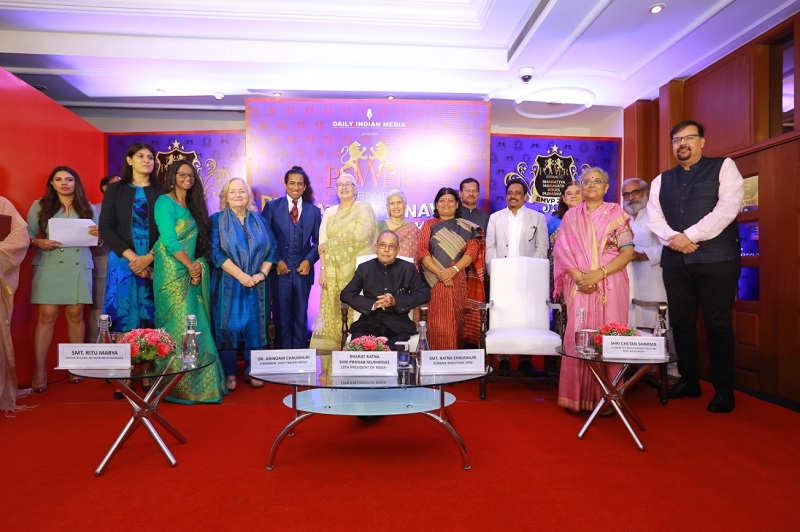
I am happy to be here today at the Bharatiya Manavata Vikas Puraskar Awards 2019. At the outset, I wish to congratulate all the award winners for their contribution towards our society in their respective fields.
Distinguished Guests, Ladies & Gentlemen,
2. The term Manavata translates to ‘humanity’. Today we are here to acknowledge and celebrate the consistent efforts of those who have contributed most diligently to the growth and development of a humanity-oriented approach in civil society. I am pleased to know that this noble initiative, which honours such people in India, has been in existence since 2009.
3. How does one understand humanity? Do we know what we mean by this word? Do we refer to the human race when we talk about humanity or its attributes and characteristics or behaviour? I believe that its meaning is best communicated in the words of the Father of our nation. Mahatma Gandhi said, and I quote, “The greatness of humanity is not in being human, but in being humane.” (Unquote)
4. Humanity and humaneness are not just moralistic ideas for us. Deriving from our ancient civilizational values, evolution through millennia and shaped strongly during our anti-colonial struggle, Humanism found deep expression in our Constitution, especially in the Fundamental Rights [as enumerated in Part III (Articles 12 to 35)] and Directive Principles of State Policies (as enumerated in Part IV of the Constitution from Article 36 to Article 51) of the Constitution of India. The objectives resolution in itself is a comprehensive statement in Humanity.
5. Even before independence, India was active at the international level in its advocacy of the promotion and protection of rights. The quest for realization of human rights and respect for human dignity was core to our independence Movement. The Indian independence Movement was also a major influence and catalyst for similar movements in other parts of the world and the end of colonization.
6. As early as 1895, Bal Gangadhar Tilak initiated the Swaraj Bill which contained the following rights, namely, the right to freedom of speech and expression, the right to equality, the right to vote and so on. After the publication of the Montague-Chelmsford Report, the Indian National Congress at its special session at Bombay demanded that the Government of India Act should contain a declaration of Rights of People embodying basic human rights. The Indian National Congress Session at Madras in 1927 passed a resolution that the future Constitution of India must have a declaration of Fundamental Rights. The Motilal Nehru Committee in 1928 and Tej Bahadur Sapru Committee in 1944-45 which drafted a Constitution for India laid emphasis on Fundamental Rights.
7. Therefore, the Indian Constitution can be viewed as an amalgamation of principals of Gandhi, Nehru, Patel, Ambedkar, Rajendra Prasad and scores of other Founding Fathers: - Nehruvian Principals included the idea of Secularism and socialistic pattern of society; - Gandhian Principals included the devolution of decision making power to the rural grassroots; and - Ambedkar Principals included the Right to Equality as well as elimination of discrimination of marginalized communities.
8. Gandhiji exemplified the meaning of being humane with his all-encompassing actions and kindness. His writings always emphasized on the need for India to be compassionate, generous, humane, kind, tolerant, to love one and all, irrespective of caste, creed, religion, gender, nationality or any other classification.
Distinguished Guests, Ladies & Gentlemen,
9. India has made strong strides in its economic development. India’s economic growth has raced between 7 and 9 per cent year after year since the past five years. India is keeping steady while a lot of Western economies are slowing down. India is becoming the new attraction for investment globally. In sports, science and cultural output too, Indian names are seen in more frequency than ever before.
10. Yet, at the same time, there is a very different India. As per various studies, India is still home to the second-highest number of poor people globally. India is also home to the highest number of illiterate people globally. The under-five child mortality rate in India is higher than in any other country in the world. As per WHO, India accounts for 17 per cent of all maternal deaths globally.
11. While Humanity can have various interpretations, one thing is clear that existence of utter poverty, illiteracy, and inaccessibility to basic health cannot be permitted in a humane society. For humanity to flourish and grow, it is first necessary to equip everyone with the capacity to be humans. I am happy to know that the Bharatiya Manavata Vikas Puraskar recognises the efforts of such individuals who work towards enabling our disadvantaged fellow citizens to at par with the rest.
12. Development is the collective progress of humanity towards a better future. However, more often than not, the gain of a few is often achieved at the expense of others. We have to remember that progress can only be said to have been made when the benefits reach the person on the bottom of the rung. We must work together to find innovative solutions to the numerous social challenges being faced by India today - hunger, malnutrition, poverty, among others. This is exactly what the legacy of India is all about as articulated in
13. I hope that the Bharatiya Manavata Vikas Puraskar resonates this very philosophy for the time to come. In fact, I believe this is what India has stood for in all its years of legacy, and that if we, as a nation and as a philosophical movement, follow this premise the India of tomorrow will be the India we all wish it to be.
Ladies & Gentlemen,
14. I congratulate the organizers on this initiative and I wish Bharatiya Manavata Vikas Puraskar all the very best in their future endeavours. I hope that you continue to support and encourage those individuals and initiatives dedicated to the cause of humanity.
